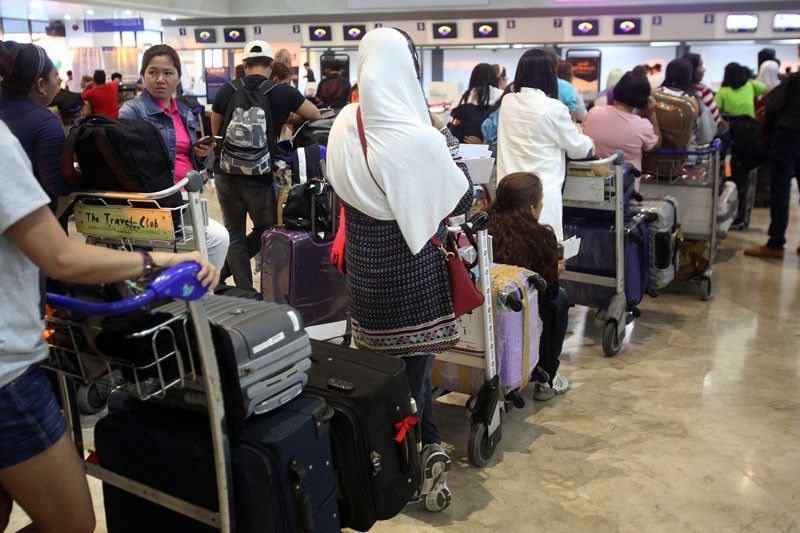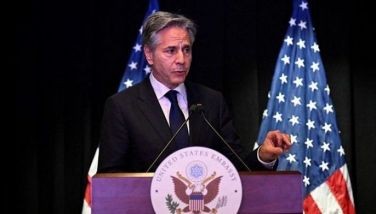Talks with Kuwait ongoing – Palace

DAVAO CITY , Philippines — The Philippines and Kuwait will continue to talk and negotiate amid a diplomatic rift caused by the controversial rescue of Filipino workers in the Gulf state.
Presidential spokesman Harry Roque Jr. said discussions are ongoing between the two nations after Kuwait took offense at the recent rescue of distressed Filipino workers from their employers by Philippine embassy officials.
Roque stressed the ongoing talks would not be made public, citing security concerns of the Filipino workers in Kuwait.
Meanwhile, Labor Secretary Silvestre Bello III said the proposed Memorandum of Understanding (MOU) with Kuwait for better treatment of Filipino migrant workers has been finalized despite the diplomatic fallout stemming from the rescue operations.
Bello said he had finalized the proposed MOU and is just waiting for President Duterte to sign it.
“It is final. It is there and just awaiting for the President to sign it,” he said.
The officials made clear the Philippine government would still push for a bilateral agreement seeking to improve the working conditions of about 262,000 Filipino workers in Kuwait.
The Department of Foreign Affairs (DFA) had said nearly 60 percent of the Filipino workers in Kuwait are domestic helpers.
Officials were eyeing to sign the agreement before the Muslim holy month of Ramadan, which starts on May 15.
The diplomatic squabble started when videos showing Philippine embassy staff rescuing Filipino workers from their employers went viral.
The Kuwaiti government viewed the rescue operations as an affront to its sovereignty but the Philippines insisted that it was a “rightful exercise” of its duty to protect its citizens abroad.
As a result, the Kuwaiti government declared Philippine Ambassador Renato Villa persona non grata. Villa returned to Manila on Wednesday.
President Duterte then announced the ban on the deployment of Filipino workers to Kuwait would be permanent and urged them to come home.
Malacañang later said Duterte’s statements were taken out of context, and the deployment ban could be reconsidered.
Bello said he is set to visit Kuwait next week to personally check on the situation of the Filipino workers there.
Bello said he was supposed to leave for Kuwait on Monday but that he had to reschedule since he has to attend the Cabinet meeting with the President tomorrow.
But Bello was quick to point out that his trip this time would need to have the approval of the Kuwaiti government.
“I am still awaiting word from their government if I am welcome to visit or not. Because if they would say I am not welcome, then I am not going there anymore,” he said.
Bello said he is still in touch with Kuwaiti Ambassador Musaed Saleh Ahmad Althwaikh, who was recalled to their country last week.
Bello is traveling to Kuwait in spite of earlier pronouncements by the President urging the more than 260,000 Filipinos working there to come home.
The President said he would look for money to finance the Filipino workers from Kuwait coming home.
Remittance concerns
A foreign exchange strategist said a permanent ban on the deployment of Filipino workers to Kuwait amid the ongoing diplomatic row could have some “medium-term” concerns over remittances.
Craig Chan, foreign exchange strategist for Asia at Nomura Securities Ltd. of Japan, said the ban on the deployment of Filipino workers to Kuwait and the call of President Duterte for Filipinos working there to come home would have a negative impact on remittances as the country’s balance of payments (BOP) position remains in deficit.
“President Duterte’s threat to ban overseas Filipino worker deployment to Kuwait and asking those Filipinos already there to return home may raise some medium-term concerns over remittances, particularly given the BOP deficit,” Chan said.
Data from the Bangko Sentral ng Pilipinas (BSP) showed remittances from Kuwait account for 10.5 percent of total remittances from the Middle East.
The number may be higher as remittances that originate in the Middle East are sometimes accounted for under remittances from the US.
As of February, remittances from Kuwait over the past 12 months amounted to $790 million, while total remittances from the Middle East over the same period were $7.7 billion or 27.1 percent of the record $28.4-billion cash remittances last year.
Chan said the imposition of a permanent ban would only have limited impact as Filipinos who would choose to leave Kuwait could seek employment in other Gulf states, especially as repatriation is voluntary.
He said Filipino workers leaving Kuwait could be redeployed elsewhere, such as in Saudi Arabia and the United Arab Emirates (UAE).
Likewise, the Philippine Overseas Employment Administration (POEA) has said there is growing demand for workers in Russia, China, Japan, South Korea and Singapore.
Nomura cited a case where the Philippine government banned the deployment of Filipino workers in Libya in 2011 amid the deteriorating security conditions that led to the decline in remittances to $330 million in 2011 from $1 billion in 2010.
“Interestingly, while the number of Filipino workers in Libya dropped sharply, we note that broader Middle East deployments rose notably, from 684,000 in 2010 to 765,000 in 2011,” Chan said.
He added there was a noted increase in broader remittances from the Middle East, which grew to $3.22 billion in 2011 rom $2.96 billion in 2010.
Overall, the ban on the deployment of Filipino workers to Kuwait could be positive for the Philippine peso over the short term but could raise risks over the medium term,” Chan said.
“The short-term positivity around a sudden acceleration in remittance if workers were to leave Kuwait could also be significantly less than expected as the amount of savings that could be remitted may be small,” he said. – Lawrence Agcaoili, Marvin Sy
- Latest
- Trending




























